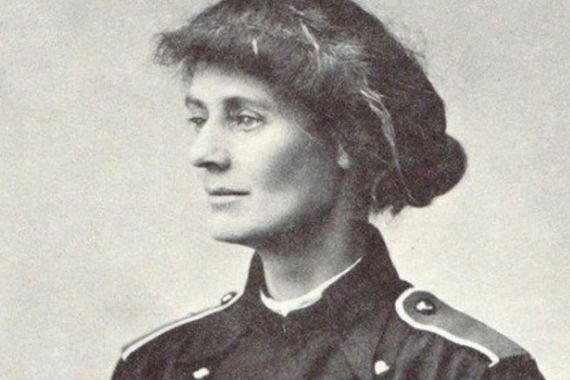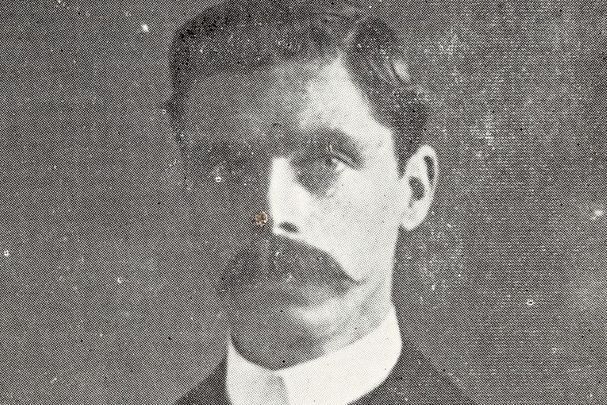Michael Mallin was born in Dublin’s “rebel” Liberties in 1874. At an uncle’s urging, he joined the British army at the age of 14 and spent six years in India.
During his time there he wrote home saying: “We aught [sic] to leave the poor people alone…if I were not a soldier I would be out fighting for them.” It was at this time that he became a nationalist, a socialist, and a trade unionist.
Because of his 14 years in the British army, Mallin was instrumental in drilling the Irish Citizen Army (ICA) where he was second-in-command to James Connolly. His objective on Easter Monday was to seize St. Stephen’s Green and the College of Surgeons. Unfortunately, he could only muster 36 men for this venture.
“We will be fighting in a short time,” he said, “…and we will have to fight alone.” He went on to add that “it will be short and sharp. We will all be dead in a short time.”
His lack of manpower may have been the reason that Mallin made a crucial error when he failed to seize the most prominent building on the Green, the Shelbourne Hotel. Not only did it have plenty of provisions, but it also had a commanding view down into the Green. The British did seize the Shelbourne and began machine-gunning the Green forcing the ICA to retreat to the College of Surgeons.
Mallin’s official second-in-command at the Green was Christopher Poole, but legend has always declared it was the fiery and remarkable Countess Markievicz. She was a true believer in what Connolly was preaching. She was instrumental in setting up barricades and is said to have shot a sniper (and perhaps even a Dublin Metropolitan Policeman). Whatever her position, it can be stated with certainty that with her ebullient personality, she made her presence in the College of Surgeons felt.

Countess Constance Markiewicz
Toward the end of the siege, she went looking for a bayonet. Mallin dryly said to her: “You are very blood-thirsty.” His military relationship with the Countess would later come into play when he was court-martialed.
With Pearse’s surrender order—confirmed by Connolly—Mallin gave up his garrison at the College of Surgeons. His men were marched down Grafton Street and had to be protected by their British captives from the vitriol of the local Dubliners.
At Richmond Barracks, he was court-martialed and faced what many of the married rebel leaders faced—the quandary between their love of Ireland and love of family. Mallin—with a pregnant wife and four children—tried to downplay his role in the rebellion and put the onus on Countess Markievicz who he incorrectly described as his superior.
Mallin at his court-martial declared: “I am a silk weaver by trade and have been employed by the Transport Union as band instructor. During my instruction of these bands, they became part of the Citizen Army and from this, I was asked to become a drill instructor. I had no commission whatever in the Citizen Army. I was never taken into the confidence of James Connolly. I was under the impression we were going out for maneuvers on Sunday but something altered the arrangements and the maneuvers were postponed till Monday. I had verbal instructions from James Connolly to take 36 men to St. Stephen’s Green and to report to the Volunteer officer there.
"Shortly after my arrival at St. Stephen’s Green the firing started and the Countess of Markievicz ordered me to take command of the men as I had been so long associated with them. I felt I could not leave them and from that time I joined the rebellion. I made it my business to save all officers and civilians who were brought in to Stephen’s Green. I gave explicit orders to the men to make no offensive movements and I prevented them attacking the Shelbourne Hotel.”

Love Irish history? Share your favorite stories with other history buffs in the IrishCentral History Facebook group.
At Richmond Barracks, he confessed to fellow prisoners to putting the responsibility on Markievicz’s shoulders because “I question if they will shoot Lizzie [Markievicz’s nickname].” It was probably the least chivalrous moment of the entire Rising.
His comments did not fool the British. In a memo to Prime Minister Asquith, General Maxwell said: “This man was second in command of the Larkinite or Citizen Army with which organization he had been connected since its inception.” His sentence was death.
With his sentence in hand, Mallin seemed to embrace what he had done. He wrote to his wife: “I do not believe that our blood has been shed in vain. I believe Ireland will come out greater and grander but she must not forget she is Catholic, she must keep the faith…I must now Prepare these last few hours must be spent with God alone. Your loving husband Michael Mallin, Commandant, Stephen’s Green Command.”
To his parents, he wrote: “I tried with others to make Ireland a free nation and failed. Others failed before and paid the price and so must we.”
Before his execution, he was described by his priest as being “serene, though very much affected.” He was shot on May 8 between 3:45 and 4:05 a.m.
But the story of Michael Mallin does not end there. It stayed very much with us through the life of his son, Father Joseph Mallin who still walked the earth until Easter 2018, when he died aged 104.
From his cell at Kilmainham, Mallin wrote to his children: “Una my little one be a Nun. Joseph my little man be a Priest if you can James & John to you the care of your mother make yourselves good strong men for her sake and remember Ireland.” Both Una and Joseph followed their father’s dying wish.
“My father, I think,” said Father Mallin, “was rather quiet but very thoughtful about the political things and the state Ireland was in. He was determined to do something about it for the good of the people—the good of the country.
"He would follow what he thought was right and just, no matter what the consequences were.”
Father Mallin also had sympathy for the conundrum his father found himself in at the time of his surrender: “Of course it wasn’t true [about Markievicz being in charge]. A family of four, one coming, we’re destitute—where does his duty lie? What answer do you give?”
Father Mallin was awarded the Freedom of the City of Dublin in 2016. The Lord Mayor of Dublin at the time, Críona Ní Dhálaig, said that Father Mallin was not only receiving tribute for being the only surviving child of one of the 1916 martyrs but also for his nearly 70 years of devoted work for the people of Hong Kong and Macau.
~~~~~~~~~~
*Dermot McEvoy is the author of "The 13th Apostle: A Novel of a Dublin Family, Michael Collins, and the Irish Uprising and Irish Miscellany" (Skyhorse Publishing). He may be reached at [email protected]. You can follow him on his website or Facebook.
* Originally published in 2016, updated in May 2024.




Comments